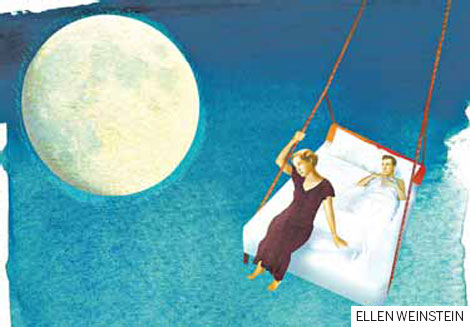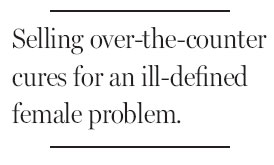A libido boost for women
Updated: 2012-07-15 07:53
By Abby Ellin(The New York Times)
|
|||||||

In the absence of government-approved female counterparts to men's potency drugs like Viagra, Cialis and Levitra, many women are turning to over-the-counter products, including lubricants, arousal gels, massage oils, nutritional and herbal supplements, and vibrators. Drugstore chains are now selling these products right next to the bandages and heating pads.
K-Y Intense, a female arousal gel that claims to heighten clitoral sensitivity, is sold at large American drugstores like Walgreens and Rite Aid and the retail giant Walmart. Sensuva's ON, an arousal oil, can be found in 640 GNC stores nationwide. Intimina by LELO, an "intimate lifestyle line" that manufactures personal massagers, apparel and "intimate cosmetics," is sold at Pharmaca Integrative pharmacies and Zestra Essential Arousal Oil are also available.
"The average woman in a committed relationship is having sex once a week," said Rachel Braun Scherl, president of Semprae Laboratories, the manufacturer of Zestra, which signed the reality television star Kris Kardashian Jenner as a spokeswoman. "Our idea is not to get them to have more sex - it's that if they're having sex they should enjoy it."
How well these products work is unclear. The industry is unregulated, and there have been hardly any clinical trials. In a randomized study reported in 2010 in The Journal of Marital and Family Therapy, women using Zestra oil reported significantly more desire, arousal and satisfaction than those given a placebo. K-Y claims that 70 percent of women in a survey agreed that its Intense gel increased arousal, orgasmic intensity, satisfaction and pleasure, but the research has not been published in a medical journal.
Erin Drought, a 28-year-old information technology consultant in Edmonton, Alberta, who says her sex drive evaporated after she began taking medicine for bipolar disorder, stumbled on Zestra in a grocery store and tried it on a whim. She did not tell her husband because "I didn't want to get his hopes up." But for whatever reason, she said, it worked.

"It was like a light switch," she said. "It was almost like the time I got my new pair of glasses and I could finally see things from far away. It was like, 'Wow, this is what it feels like to see.'"
Many of the arousal products use "peppermint oil or some variation; the idea is to make you tingly," said Bat Sheva Marcus, clinical director of the Medical Center for Female Sexuality in Manhattan and Purchase, New York. "Some people find it burns, some find it really arousing, or nothing."
A more difficult question is how to define "sexual enhancement" in the first place. For men, after all, the problem tends to be self-evident; for women the questions are more complicated.
"Do they not want to have sex at all? Is there a decrease in sexual desire? Do they have an orgasm? You have to separate it," said Dr. Cheryl L. Perlis, a gynecologist in Lake Bluff, Illinois. "Some people can't physically have an orgasm at any age. There are a lot of different definitions."
Female sexual dysfunction remains a controversial topic, even as it becomes an official diagnosis (to be called female sexual interest/arousal disorder) in the DSM-V, the new edition of the psychiatric diagnostic manual, due in 2013.
Leonore Tiefer, a sex therapist who is a clinical associate professor of psychiatry at New York University School of Medicine, argued in a 2006 article in PLoS Medicine that female sexual dysfunction was a cultural construct, a "textbook case of disease-mongering by the pharmaceutical industry and by other agents of medicalization," including health care professionals and journalists.
Dr. Marcus disagrees. "F.S.D. is a real problem," she said. "To say that women are complaining about their sex lives because pharmaceutical companies told them to is really insulting to women."
And Dr. Michael L. Krychman, a gynecologist in Newport Beach, California, who specializes in sexual medicine, said: "These sexual complaints are real; they're not imagined. Women are suffering in silence, and they're looking for solutions."
The New York Times
(China Daily 07/15/2012 page11)